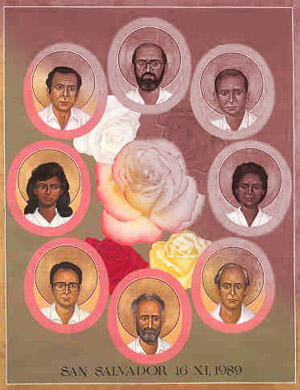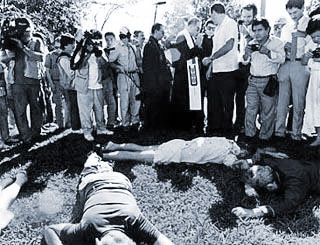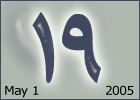Issue 19
Aufaugh Emam
Graduate Student at the University of Toronto
The news of the death of Pope John Paul II just a few weeks ago was immediately followed by a widespread portrayal of him as a universal symbol of human rights and dignity. This overwhelming reaction recalled in my mind a horrific event that took place about fifteen years ago in El Salvador, during which a group of six intellectual priests along with two of their collaborators were assassinated. In November 1989, six Jesuit priests, Ignacio Ellacuría, Ignacio Martín-Baró, Segundo Montes, Amando López, Juan Ramón Moreno and Joaquin López y López along with their coworkers Julia and Celina Ramos were murdered on the campus of the University of Central America (UCA), which served as both their home and their place of work. The assassination was carried out in an organized manner by the Atlacatl Battalion, an elite army unit that was created, trained and equipped by the United States.

To understand the real causes behind this crime, one must study it in its proper social and political context. In the early 1980’s, El Salvador witnessed the breakout of a civil war, which put a large majority of Salvadorans under immense pressure and left them with no other choice but outright resistance. The murder of the Jesuits, thus, should not be analyzed in isolation, but considered alongside the murder of tens of thousands of innocent Salvadorans, due to their demands for justice and equality, by the squads of the right wing government. The crime of the Jesuits of UCA, which ended up costing them their lives, was that they, along with millions of other Salvadorans, realized the extent of the misery that was spreading throughout and dominating their country, and that they proposed a change that could benefit all. It is much too late today to repair the damages done; too many lives have been sacrificed. The least we can do now is to be truthful in our analysis of this atrocious crime, and to realize that our collective and candid understanding of the events and circumstances that set this act in motion will help put an end to future crimes of such magnitude.
Today, more than 15 years after this event, there remains no doubt that the assassination was a well planned and organized act, carried out by the Atlactl Battalion, which received direct orders from higher level officials within the government of El Salvador, with the full knowledge and support of the U.S. government. To ignore the true intentions behind this crime and to disregard the entire organization at work that set this act in motion, in other words to see the assassination of the Jesuits of El Salvador as a result of a moment of pique experienced by a military group confused by the situation, is to lose sight of the most critical fact that this crime verified. Ultimately, the killing resulted from the willingness of those in El Salvador with political and economic power, to commit, with the aid of their U.S. allies, the most horrendous of crimes in order to prevent any changes in the distribution of power and wealth that conflicted with their own interests.
What exactly did the Jesuits have to offer the Salvadorans that was so threatening to the interests of the Salvadoran elite and their U.S. allies to the point of allowing them to commit such an appalling act? The Jesuits, along with many other Salvadorans, had accurately understood that the root of the problems in El Salvador was structural flaws within the system, and had from the very beginning of the armed conflict clearly stated their position that there could be no peaceful end to the situation between the government and the insurgents, the Farabundo Martí National Liberation Front (FMLN). Ellacuría’s position on this situation was that “a military solution by the Armed Forces by means of an intervention from the U.S. army, although it would be physically possible, would leave the national problem unsolved and would not permit the annulment of oligarchic and imperialist power which weighs heavily over Salvadoran reality and is the principal cause of its ills.”

He proposed the creation of a third force, which would stand above and beyond its own interests to serve the interests of the people, as the only way of achieving peace in El Salvador. This third force, according to Ellacuría, would be a strictly social force with no political power. Based on this brief look at Ellacuría’s writingsm thus, it becomes apparent that he in fact maintained quite a critical stance towards the FMLN. In spite of his frequent clashes with the insurgency, however, many attempts were made by sectors in the extreme right, especially in the days leading up to the assassination, to create a false image of the Jesuits in agreement with the FMLN ideologies and supportive of their conducts. These attempts were not without their intended consequences, and it was largely the creation of such false images that ultimately paved the way that lead to this massacre.
Shortly after the massacre in November of 1989, a massive cover-up campaign was initiated by the Salvadoran government, with the aid of the U.S., to prevent any leakage of information regarding the involvement of high level officials in this crime. The High Command immediately charged the FMLN for the murders while those truly responsible were protected for months with the full knowledge of the U.S. embassy and the U.S. military group in El Salvador. Much evidence was destroyed and many witnesses were silenced. Mrs. Lucía Cerna, the only witness left to the events of the night of the murder, was taken in by the FBI, insulted and threatened to the point of retracting her story. U.S. Major Eric Buckland, a senior military advisor in El Salvador, who had confessed on several occasions that the assassination was well planned and that he had prior knowledge of the military’s intent to take out the Jesuits, was also pressured into changing his testimony during the course of the trial.
The trial for the eight murdered lasted only three days, from 26 to 29 of September 1991. The defendants were limited to eight men hand picked by the military Honour Commission: Colonel Guillermo Benevidas, the head of the military academy and seven other soldiers who ranked no higher than lieutenant. The Jury found only Colonel Benevidas and Lieutenant Mendoza guilty of murder. In April of 1993 Benevidas and Mendoza were released from Prison. The man that had ordered the murders in the first place, Colonel Ponce was promoted from colonel to general and from the head of the joint chiefs to Staff to Minister of Defence. Ponce remained a client of the United States and continued to serve his country until June 1993 when he retired with honours and full pension.
The assassination of the Jesuits of El Salvador is merely one example among thousands of such crimes that the United States government has participated in, either directly or indirectly, and has knowingly allowed to take place in many countries around the world, in the name of democracy and human rights, a strategy that continues to this day. The same government that was mourning the loss of the Pope just a few weeks ago has its hands washed in the blood of the six intellectual martyrs of El Salvador just over fifteen years ago. Over the last several decades, the U.S. government has continuously used and abused poor nations of the third world as experimental fields for its so-called exercises in democracy. Any organizations or private individuals that realize the roots of injustice and misery in these countries, and who have the courage to publicly announce this reality and/or propose an alternative, inevitably put themselves at risk.
The assassination of the Jesuits of El Salvador is a prototype of this reality. These men of honour sacrificed their lives envisioning and pursuing a more humane society for all, a message central to Catholic teachings, as opposed to the hot topics of debate in the church today such as homosexuality and abortion, to which the bible makes no inferences. Our knowledge of history is our most valuable weapon against the political imperialism that is rapidly dominating our world today. Any fair observer can recognize the similarities between U.S. policies and practices in El Salvador in the eighties and what that government is doing today in countries such as Iraq and Afghanistan. How much longer are we going to allow history to repeat its mistakes?












